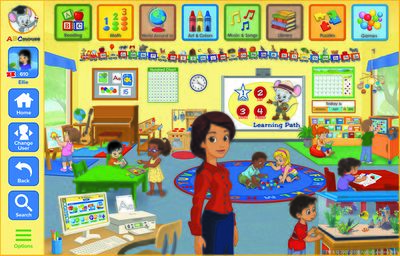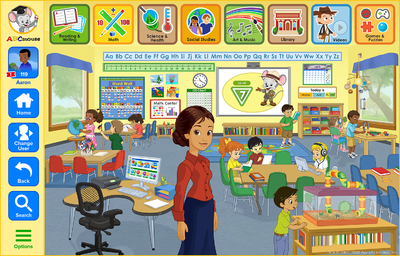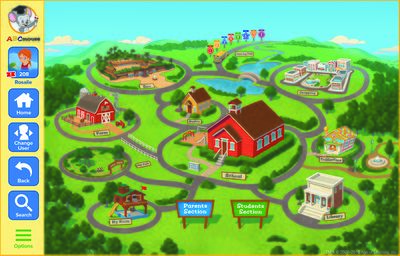ABCmouse
Introduction
ABCmouse.com® Early Learning Academy is a commercial integrated web-based learning environment for small children.
According to Wikipedia, “[..]In 2005, Dohring founded Age of Learning, Inc., and launched ABCMouse.com Early Learning Academy, “designed to teach basic reading, math, science and other subjects to children between the ages of two and six,” according to The Wall Street Journal. In January 2017, Age of Learning expanded the ABCmouse curriculum through 2nd grade. ABCmouse.com charges a monthly fee of $7.95 per month or $79.95 per year, and is free to individual teachers, libraries, Head Start programs, and other community organizations.”. Also according to Wikipedia, “Age of Learning launched ABCmouse.com in 2010 after three years of development, guided by a team of educators, and following testing by 10,000 families.[26] The original patent for a vertically integrated educational system was authored by Doug Dohring, David Hendry, and Mike Bundlie.”.
See also:
- Adventure Academy, a environment for older children developed by the same company.
- Starfall, a similar, but mostly free environment
- Begin, another commercial environment
The environment
ABCmouse is a web application available at https://www.abcmouse.com/. It includes over 8000 learning activities for children from age 3 to 8.
A classroom is the starting point for all activities:. The home page (button to the left) regroups various activities, e.g. a map allows navigating to various places in the "world" of ABCmouse.


There are two other navigation screens, i.e. a "home page" and a geographical map of the world


Learning paths in an area can visualized step by step as in the following screenshot.

Learning activities
The system supports four main subject areas: Reading and language arts, Math, Science and social studies (the world around us), Art and Colors.

There are several activity types according to the ABCmouse home page (retrieved May2 2019)
- Animations are entertaining animated activities that explain various subjects.
- Games teach specific educational concepts, e.g. to learn the alphabet, new words, numbers and shapes, and about the planet
- Books include stories and non-fiction, i.e. more declarative knowledge
- Songs reinforce the other subjects but also introduce to music
- Puzzles, develop problem solving and critical thinking skills and help children remember important ideas and skills in reading,math, science, art, social studies, and music.
- Art activities, e.g., coloring pages, dot-to-dots, paint-by-numbers, or traceables, help children learn all subject areas while while they are expressing themselves artistically.
- Printables support various off-line learning activities
In addition, for the children, there is an interactive zoo, an aquarium, a farm. Parents and teachers can use a progress tracker, that displays completed learning activities and progress in subject areas by level.
Parent control
Parents have access to a dashboard that summarizes learning activities and progress, and offers support.

Research
According to a study by Thai and Ponciano (2016) [1] that doing ABCmouse activities significantly increased kindergarten readiness score at the end of prekindergarten and improved literacy and math skills.
(Thai and Ponciano, 2016:22).
As general conclusion, the authors state that “This research contributes to the growing evidence that the appropriate and intentional integration of well-designed educational technology into the classroom can positively impact student learning.” (Thai and Ponciano, 2016:23).
Zamora and Pitnam (2018) [2] conducted a study that on two computer-based reading software programs that claim to aid in improving student reading performance, ABCmouse and Starfall. “[..] Students were randomly assigned to complete learning activities associated with their designated reading software program for 45-minutes a week for five weeks. Findings revealed reading level increases with 85% of participants, which aligned with previous research that examined useof these two reading software programs (Age of Learning, 2016; Lozano & Ponciano, 2016; Metis Associates, 2014; Thai& Ponciano, 2016). Reasons for reading level increases may be attributed to the targeted practice that participants received with each of the five essential components of reading as identified by the National Reading Panel (2016). ABCmouse and Starfall included opportunities for participants to develop their reading skills for phonemic awareness, phonics, fluency, vocabulary, and comprehension.” (Zamora and Pitnam, 2018: 61).
Of course, this study only shows that learners engaging in well designed structured learning activities have better results that those who do no engage in anything that is simular. Therefore, we can make the case that the use of environments such as ABCmouse do have a positive effect if they include well-designed learning activities. From the literature we looked at, we cannot make any recommendations with respect to the choice of this software vs. other alternatives.
Ponciano (2014) [3] looked the home-school connection, i.e. parent engagement. They firstly recall that that parent engagement can lead to higher levels of academic readiness and achievement and, based on a study, that “online early learning websites have the potential to offer opportunities for teachers and parents to collaborate on the education of young children.”
Criticism
Some users complain about the business model (automatically renewed rental that seems to be very difficult to cancel), e.g. Parent reviews for ABCmouse.com.
Other mention the fact that learning activities may be diluted in other activities, which is often the case in large integrated environment.
Finally, the religious beliefs of its founder, Doug Dohring, are critized. In some countries, like Germany, this software may not be allowed for use in schools.
Bibliography
Cited with footnotes
- ↑ Thai, K.P. Ph.D. and Ponciano, Leslie Ph.D. (2016) "Improving Outcomes for At-Risk Prekindergarten and Kindergarten Students with a Digital Learning Resource," Journal of Applied Research on Children: Informing Policy for Children at Risk: Vol. 7 : Iss. 2 , Article 8. Available at: https://digitalcommons.library.tmc.edu/childrenatrisk/vol7/iss2/8/
- ↑ Zamora, V., & Pittman, R. T. (2018). The Effects of Two Computer-Based Reading Software Programs on Student Reading Performance. TEXAS ASSOCIATION FOR LITERACY EDUCATION YEARBOOK, 56.
- ↑ Ponciano, L. (2014, March). Creating a home-school connection in early childhood through technology: Parent engagement and ABCmouse. com. In Society for Information Technology & Teacher Education International Conference (pp. 1920-1926). Association for the Advancement of Computing in Education (AACE).
Other
Age of Learning. (2016). Three large-scale studies assess the effectiveness of ABCmouse.com: Age of Learning research highlights. Retrieved from http://www.ageoflearning.com/blog/age-of-learning-abcmouse-research-highlights.html
Lozano, P., & Ponciano L. (2016). Using early learning technology to prepare Head Start families for kindergarten. Retrieved from http://www.ageoflearning.com/case_studies/ABCmouse_CaseStudy_Albina_Head_Start.pdf
Metis Associates (2014). Evaluation of the Starfall kindergarten curriculum in Roaring Fork School District: Findings from the 2012-2013 evaluation. Retrieved from http://more.starfall.com/downloads/K-StarfallEvaluationReport.php
T. Horiuchi, M. Rothschild, R. Barrera, and S. Gururajan. Designing a personally meaningful abcmouse.com: Challenges and questions in an edtech recommendation system. In 2nd KidRec Workshop co-located with ACM IDC 2018. Available at: https: //drive.google.com/file/d/1PpF0vAi4Osr6HCTDVTFc4on_h445so2d/view, 2018.
Thai, K. P., & Ponciano, L. (2016). Improving outcomes for at-risk prekindergarten and kindergarten students with a digital learning resource. Journal of Applied Research on Children: Informing Policy for Children at Risk, 7(2), 1-29
Acknowledgement
Screenshots in this page of ABCmouse.com® Early Learning Academy have been copied from https://www.ageoflearning.com/media/ and are used with permission. Quote: “Please feel free to use the assets included here for non-commercial purposes, including classroom uses and journalism.”.